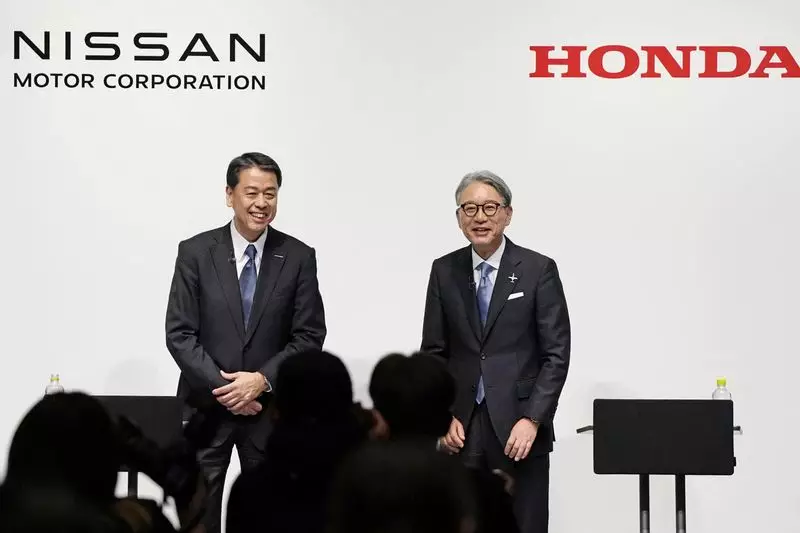The global automotive landscape is undergoing a seismic shift, with traditional powerhouses like Honda and Nissan feeling the pressures of innovative competitors — namely, electric vehicle (EV) manufacturers such as Tesla and notable Chinese brands. In a move indicative of these challenges, Honda and Nissan are reportedly in discussions to deepen their existing partnership, potentially culminating in a merger that could redefine the future of Japan’s automotive sector.
Nissan’s recent struggles, marked by severe profit losses and cutbacks in production, have prompted the company to explore ways of enhancing synergy with Honda. The most pressing news from Nissan’s camp is a $2.6 billion cost-saving initiative that includes a dramatic reduction of 9,000 jobs and a 20% cut in global production capacity. This is not merely an operational overhaul; it is a sign of a company wrestling with an 85% downfall in second-quarter profits due to waning sales in critical markets like China and the United States. Meanwhile, Honda is under its own pressures; its cash flow is expected to decline in the coming year, and its efforts in the EV sector have yet to gain substantial traction. This makes a collaboration with Nissan not just appealing but necessary.
A potential merger between Honda and Nissan would culminate in a colossal entity with a staggering market value of around $54 billion, eclipsing annual vehicle production to 7.4 million units — positioning it as the third-largest car manufacturer globally, trailing only Toyota and Volkswagen. This reshaping of Japan’s automotive giants might create a formidable competitor in an industry increasingly influenced by technological advancements and aggressive pricing wars propelled by pioneering companies like Tesla and BYD.
The strategic partnership established earlier this year has already laid groundwork for collaboration in EV development. Given the urgency instigated by Nissan’s predicament, the discussions now encompass various collaborative avenues, including the possibility of forming a holding company that could streamline operations and bolster shared technology initiatives.
Market Reactions and Speculations
Market responses to these developments have been emblematic of investor sentiment. While Nissan’s stock surged nearly 24% upon the announcement of deepened discussions, Honda’s share value reflected caution, declining by 3%. Mitsubishi Motors, with Nissan as its significant shareholder, also experienced a notable spike in share price, highlighting the interconnectedness of these Japan-based automakers amid the shifting dynamics.
In keeping with the potential merger, Renault, Nissan’s largest stakeholder, is open to exploring the implications of such a union. This indicates a broader interest in consolidating efforts within the automotive industry, especially given the volatile economic climate represented by the looming threat of tariffs on products produced in North America.
A Landscape Marked by Competition and Regulation
There’s no denying that the automotive industry is facing unprecedented pressures, primarily due to the aggressive pricing strategies employed by EV entrants like Tesla and BYD, which have significantly altered consumer expectations and market dynamics. With ongoing discussions indicating a shared strategy to combat these shifts, a merger could serve as a critical lifeline enabling Honda and Nissan to consolidate resources and remain competitive.
However, any merger would not come without its share of regulatory scrutiny, especially in the U.S. market, as President Trump has signaled intentions to impose stringent rules on imported vehicles. Negotiating concessions may be a necessary pathway to achieve merger approval, complicating what is already a multifaceted discussion.
Should these discussions culminate in an actual merger, the harmonization of corporate cultures will be a fundamental concern. Honda’s deeply rooted focus on technology and innovation contrasts starkly with Nissan’s current state of flux, presenting potential roadblocks to effective integration. Analysts have suggested that mergers in the automotive sector have not often led to fruitful outcomes, primarily due to vast differences in operational philosophies and management styles.
While the prospect of forming a resilient counterbalance to Toyota is an exciting vision, analysts caution that a genuine merger will require painstaking attention to the nuances of corporate culture. As such, any successful collaboration between Honda and Nissan must involve aligned goals, shared vision, and, importantly, the creation of a unified identity that can thrive amidst the growing competition.
The future of Honda and Nissan is rife with possibility, albeit fraught with challenges. The convergence of necessity and opportunity may very well chart a new course for both companies, transforming the landscape of the automotive industry as we know it.

